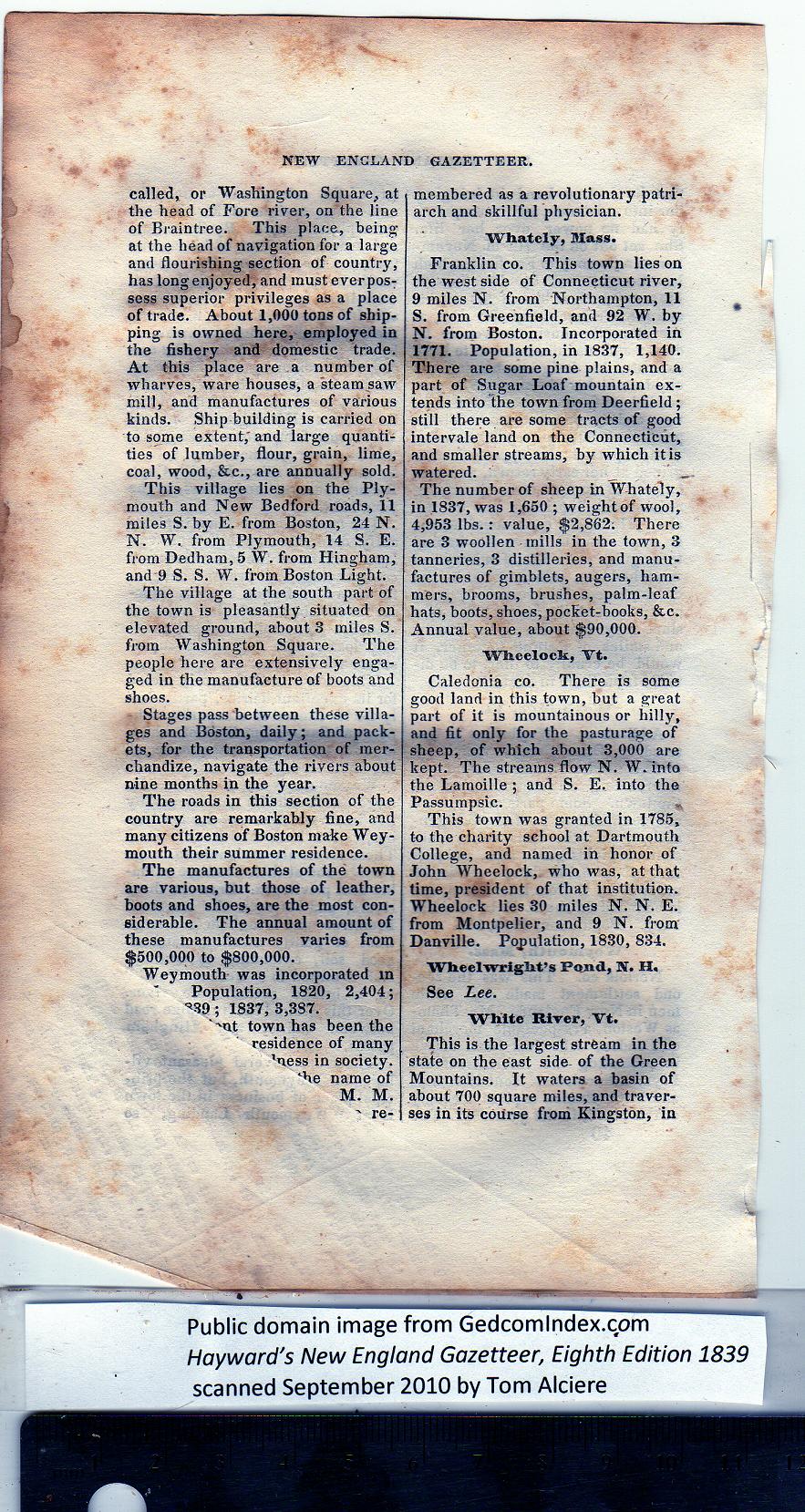|
called, or Washington Square, at
the head of Fore river, on the line
of Braintree. This place, being
at the head of navigation for a large
and flourishing section of country,
has long enjoyed, and must ever pos-
sess superior privileges as a place
of trade. About 1,000 tons of ship-
ping is owned here, employed in
the fishery and domestic trade.
At this place are a number of
wharves, ware houses, a steam saw
mill, and manufactures of various
kinds. Ship building is carried on
to some extent,' and large quanti-
ties of lumber, flour, grain, lime,
coal, wood, &c., are annually sold.
This village lies on the Ply-
mouth and New Bedford roads, 11
miles S. by E. from Boston, 24 N.
N. W. from Plymouth, 14 S. E.
from Dedham, 5 W. from Hingham,
and 9 S. S. W. from Boston Light.
The village at tbe south part of
tbe town is pleasantly situated on
elevated ground, about 3 miles S.
from Washington Square. The
people here are extensively enga-
ged in the manufacture of boots and
shoes.
Stages pass between these villa-
ges and Boston, daily; and pack-
ets, for the transportation of mer-
chandize, navigate the rivers about
nine months in the year.
The roads in this section of the
country are remarkably fine, and
many citizens of Boston make Wey-
mouth their summer residence.
The manufactures of the town
are various, but those of leather,
boots and shoes, are the most con-
siderable. The annual amount of
these manufactures varies from
$500,000 to $800,000.
Weymouth was incorporated in
Population, 1820, 2,404;
^39; 1837, 3,3S7.
^ut town has been the
residence of many
’ness in society,
‘be name of
M. M.
' re- |
membered as a revolutionary patri-
arch and skillful physician.
Whately, Mass.
Franklin co. This town lies on
the west side of Connecticut river,
9 miles N. from Northampton, 11
S. from Greenfield, and 92 W. by
N. from Boston. Incorporated in
1771. Population, in 1837, 1,140.
There are some pine plains, and a
part of Sugar Loaf mountain ex-
tends into the town from Deerfield;
still there are some tracts of good
intervale land on the Connecticut,
and smaller streams, by which it is
watered. _
The number of sheep in Whately,
in 1837, was 1,650 ; weight of wool,
4,953 lbs.: value, $2,862. There
are 3 woollen mills in tbe town, 3
tanneries, 3 distilleries, and manu-
factures of gimblets, augers, ham-
mers, brooms, brushes, palm-leaf
hats, boots, shoes, pocket-books, &c.
Annual value, about $90,000.
Wheelock., Vt.
Caledonia co. There is some
good land in this town, but a great
part of it is mountainous or hilly,
and fit only for tbe pasturage of
sheep, of which about 3,000 are
kept. The streams flow N. W. into
the Lamoille ; and S. E. into the
Passumpsic.
This town was granted in 1785,
to the charity school at Dartmouth
College, and named in honor of
John Wheelock, who was, at that
time, president of that institution.
Wheelock lies 30 miles N. N. E.
from Montpelier, and 9 N. from
Danville. Population, 1830, 834.
Wheel wriglit’s Pond, N. II.
See Lee.
White River, Vt.
This is the largest stream in the
state on the east side- of the Green
Mountains. It waters a basin of
about 700 square miles, and traver-
ses in its course from Kingston, in |
